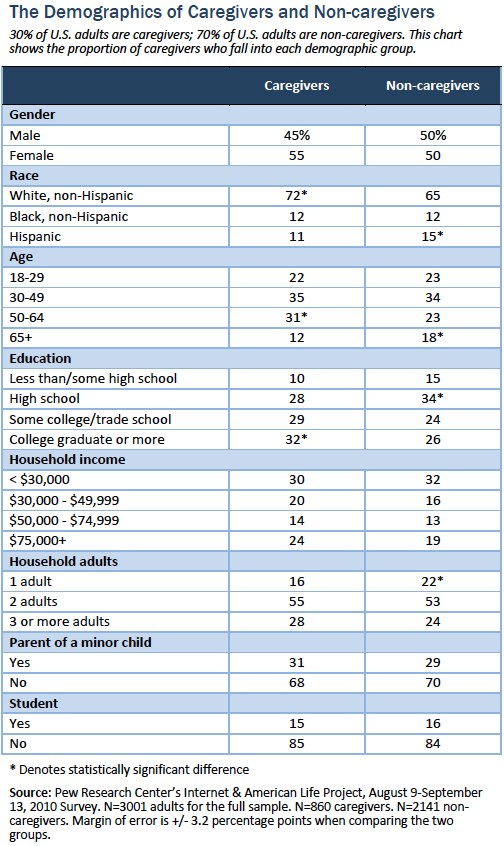Caregivers Online
The internet is an integral part of the lives of people who care for loved ones.
Thirty percent of U.S. adults help a loved one with personal needs or household chores, managing finances, arranging for outside services, or visiting regularly to see how they are doing. Most are caring for an adult, such as a parent or spouse, but a small group cares for a child living with a disability or long-term health issue.
Eight in ten caregivers (79%) have access to the internet. Of those, 88% look online for health information, outpacing other internet users on every health topic included in our survey, from looking up certain treatments to hospital ratings to end-of-life decisions.
Caregivers are significantly more likely than other internet users to say that their last search for health information was on behalf of someone else: 67% vs. 54%. Just 29% of online caregivers say their last search was solely focused on their own health or medical situation, compared with 40% of non-caregivers who go online for health information.
Caregiving is associated with being online and with online e-health behaviors.
Caregivers are somewhat better educated and more likely to be middle-aged (ages 50-64) than are non-caregivers. However, statistical analysis shows that when comparing people of similar age, education and other demographic characteristics, being a caregiver in and of itself is associated with a greater likelihood of using the internet, particularly to get and share health information.
Caregivers are highly social, both online and offline.
Caregivers are more likely than other internet users to take advantage of social tools related to health:
- 44% of online caregivers have read someone else’s personal health story online, compared with 29% of non-caregivers.
- 28% of online caregivers who use sites like Facebook have followed their friends’ personal health experiences or health updates, compared with 21% of non-caregivers who use such sites.
- 26% of online caregivers have looked online for someone with similar health concerns, compared with 15% of non-caregivers.
Caregivers are also more likely than other people to tap into their offline social networks when they need health information, care, or support. The last time they had a health issue:
- 70% of caregivers say they turned to friends and family members for information, care, or support, compared with 47% of non-caregivers who did the same.
- 28% of caregivers say they turned to others who have the same health condition, compared with 17% of non-caregivers who did so, either online or offline.
Caregivers are active health care consumers.
Caregivers are more likely than other internet users to read online reviews of drugs, clinicians, and medical facilities:
- 38% of online caregivers have consulted online reviews of particular drugs or medical treatments, compared with 18% of non-caregivers.
- 21% of online caregivers have consulted online rankings or reviews of doctors or other providers, compared with 13% of non-caregivers.
- 20% of online caregivers have consulted online rankings or reviews of hospitals or other medical facilities, compared with 12% of non-caregivers.
Statistical analysis shows that being a caregiver has a significant association with an internet user’s likelihood to consult such reviews. It is not just that caregivers are more likely to be older, more highly educated, and living with chronic conditions (groups likely to do this type of research). Being a caregiver is independently associated with higher levels of a variety of health information-seeking behaviors.





